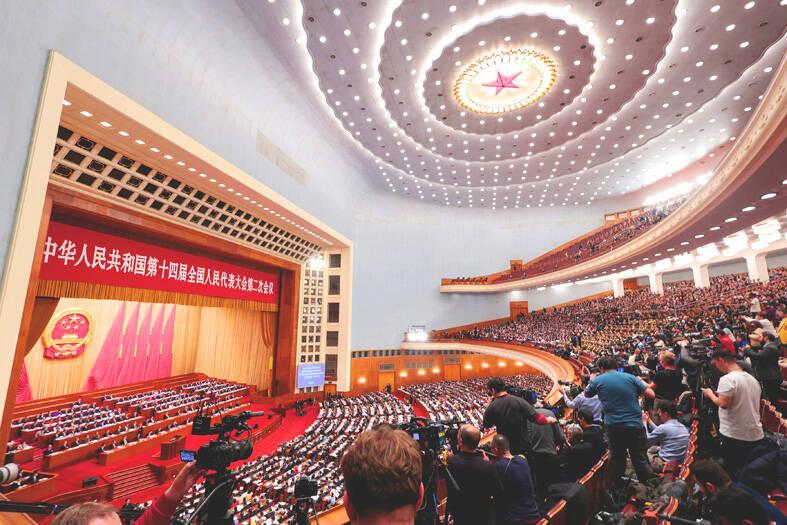China is stepping up cognitive warfare against Taiwan, as its United Front Work Department develops a specialized misinformation task force, a national security official said.
China is currently holding the National People’s Congress and Chinese People’s Political Consultative Conference, an annual gathering of the Chinese government known as the “two sessions.”
United Front Work Department head Shi Taifeng (石泰峰) has convened a specialized task force aimed at spreading misinformation about the situation in Ukraine and Taiwan’s semiconductor investments in the US, a national security source said on condition of anonymity.

Photo: Reuters
Spreading this wave of misinformation is a top priority for Beijing, the source cited Shi as saying at the “two sessions.”
As China is highly uncertain of US President Donald Trump’s evolving policies, it must “make Taiwanese people doubt the US and hate Trump, and ensure divisions within Taiwan run long and deep,” he said, according to the source.
The goal of the operation is to “make sure no one in Taiwan trusts the US,” he reportedly said, calling for all government agencies to mobilize and “treat this as a real battle.”
This new wave of cognitive warfare aims to spread narratives that Trump wants to sell out Taiwan, that Taiwan Semiconductor Manufacturing Co would become American and that Taiwan would ultimately fail against China, the source said.
These narratives are to be spread rapidly by Chinese state media, social media platforms and a network of fake accounts and cooperative media outlets in Taiwan, they said.
National security agencies have already noticed suspicious accounts spreading this misinformation in recent days, the source added.
China’s Ministry of State Security has proposed exploiting divisions over Trump within Taiwan to deepen internal conflict, another national security official said.
It also proposed to spread Taiwanese criticism of Trump and on X and other English-language social media platforms to make Trump think Taiwanese are attacking him, sowing discord in Taiwan-US relations, the official said.

Taiwan has received more than US$70 million in royalties as of the end of last year from developing the F-16V jet as countries worldwide purchase or upgrade to this popular model, government and military officials said on Saturday. Taiwan funded the development of the F-16V jet and ended up the sole investor as other countries withdrew from the program. Now the F-16V is increasingly popular and countries must pay Taiwan a percentage in royalties when they purchase new F-16V aircraft or upgrade older F-16 models. The next five years are expected to be the peak for these royalties, with Taiwan potentially earning

STAY IN YOUR LANE: As the US and Israel attack Iran, the ministry has warned China not to overstep by including Taiwanese citizens in its evacuation orders The Ministry of Foreign Affairs (MOFA) yesterday rebuked a statement by China’s embassy in Israel that it would evacuate Taiwanese holders of Chinese travel documents from Israel amid the latter’s escalating conflict with Iran. Tensions have risen across the Middle East in the wake of US and Israeli airstrikes on Iran beginning Saturday. China subsequently issued an evacuation notice for its citizens. In a news release, the Chinese embassy in Israel said holders of “Taiwan compatriot permits (台胞證)” issued to Taiwanese nationals by Chinese authorities for travel to China — could register for evacuation to Egypt. In Taipei, the ministry yesterday said Taiwan

Taiwan is awaiting official notification from the US regarding the status of the Agreement on Reciprocal Trade (ART) after the US Supreme Court ruled US President Donald Trump's global tariffs unconstitutional. Speaking to reporters before a legislative hearing today, Premier Cho Jung-tai (卓榮泰) said that Taiwan's negotiation team remains focused on ensuring that the bilateral trade deal remains intact despite the legal challenge to Trump's tariff policy. "The US has pledged to notify its trade partners once the subsequent administrative and legal processes are finalized, and that certainly includes Taiwan," Cho said when asked about opposition parties’ doubts that the ART was

If China chose to invade Taiwan tomorrow, it would only have to sever three undersea fiber-optic cable clusters to cause a data blackout, Jason Hsu (許毓仁), a senior fellow at the Hudson Institute and former Chinese Nationalist Party (KMT) legislator, told a US security panel yesterday. In a Taiwan contingency, cable disruption would be one of the earliest preinvasion actions and the signal that escalation had begun, he said, adding that Taiwan’s current cable repair capabilities are insufficient. The US-China Economic and Security Review Commission (USCC) yesterday held a hearing on US-China Competition Under the Sea, with Hsu speaking on